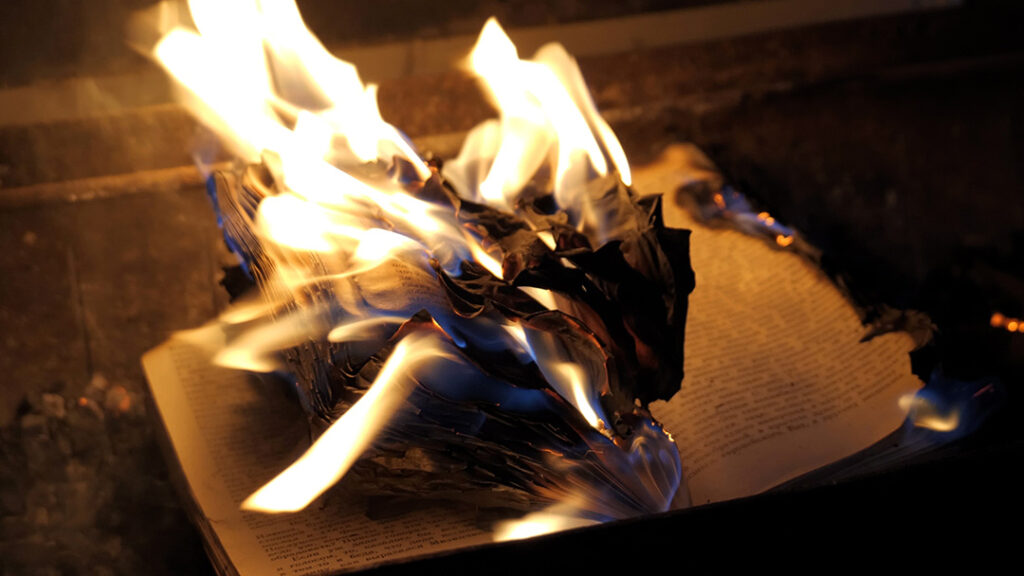Burning the Quran: Freedom of speech or hate crime in Sweden?
Burning the Quran: Freedom of speech or hate crime in Sweden?
In Sweden, the Quran has recently been desecrated and burnt. Is the burning of holy books an act of freedom of speech or a hate crime?
On the 28th June 2023, Salwan Momika, an Iraqi refugee living in Sweden, desecrated and burnt a copy of the Quran outside the Stockholm Central Mosque.[1] This event follows other incidents[2] [3] in recent months and years of holy books being burnt. The perpetrators have defended the burnings, citing their right to freedom of speech.
However, in response to recent events, the UN human rights council has approved a controversial resolution that urges countries to “address, prevent and prosecute acts and advocacy of religious hatred.”[4] This article will reflect on cases of holy book burning and also what they tell us about developments in the debate on the right to freedom of speech vs hate crime.
Momika’s book burning
It is difficult to establish Momika’s exact motivation for burning the Quran in June this year. Momika arrived in Sweden in 2018 but he was recently denied permanent residency. He has been in trouble with the authorities in both Iraq and Sweden and is believed to have a militant background.[5] Moreover, Momika says that since 2022 he has been a member of Sweden’s far-right nationalist party, the Sweden Democrats.[6] What is clear is that Momika was motivated to generate an international controversy.
There was substantial fallout following Momika’s burning. In Iraq, this incident generated widespread anger and led some in the country to storm Sweden’s embassy in Baghdad. The Iraqi government recalled the Swedish ambassador and called the act “racist” and “irresponsible.”[7] Beyond Iraq, protests occurred in other Muslim-majority countries such as Turkey, Jordan and Morocco. Moreover, the US Department of State rejected the incident and the Swedish government labelled it as “Islamophobic.”[8]
Burning the Quran in Sweden
The events of June are not the only time holy book burning has occurred in Sweden. In fact, the country has been the location of a handful of near and actual incidents. Just over 2% of the Swedish population are refugees and, whilst there are no exact statistics, a significant portion of refugees are from Muslim-majority nations.[9]
In reaction to this, a brand of anti-Islam far-right sentiment has grown in Sweden. This is evident in the rise of Rasmus Paludan. Paludan is a far-right Swedish politician who set fire to a copy of the Quran in front of Turkey’s embassy in Stockholm in January 2023.[10] Paludan had previously said that “‘the enemy is Islam and Muslims. The best thing would be if there were not a single Muslim left on this earth.”[11] Paludan defends the incident and his comments as acts of free speech. Because Sweden has particularly far-reaching laws on freedom of expression,[12] Paludan’s inflammatory statements and actions cannot be restricted.
What’s wrong with book burning?
Despite the fallout, there are many who would ask the question: what is wrong with book burning? If freedom of expression is the right for everyone to “hold opinions and to receive and impart information and ideas without interference by public authority and regardless of frontiers,”[13] then book burnings must be acceptable? Surely if the ability to express your views is the cornerstone of democracy, policing ideas risks us sliding down the slippery slope of censorship?
The people who support this line of argument are wide-reaching and include religious individuals. For example, Aron Verstandig, chairman of the Council of Swedish Jewish Communities has come out against an outright ban on burning holy books in the country.[14] He said that “in Sweden we have a very wide freedom of expression and demonstration. That’s good, not least for those of us who belong to a minority. It gives us strong protection to state our views even when they conflict with the opinion of the majority.”[15] For Verstandig, banning book burnings was not the way forward.
Painful legacy of book burnings
However, it is important to look at the history of holy book burnings and how modern-day burnings draw up painful memories of the past. It should be noted that in Islam, the Quran should be revered not just because of the message it contains, but as an object. Believers must perform ritual washing (wudu) before touching it.[16] Therefore, intentionally damaging copies is considered blasphemous under Islamic law.
There are many instances of the Quran being burnt throughout history. In the Catholic monarchy of Granada in 1492, Catholics raided Islamic and Jewish libraries and burnt virtually all non-Christian books in one of the largest book burnings in modern history.[17] Furthermore, following the printing of a new, royal edition of the Quran in Egypt in 1924, many pre-1924 Qurans that were seen as flawed were dumped in the river Nile.[18]
Moreover, there have also been many notorious incidents of Jewish scriptures being burnt. For example, in 1242 at the command of the pope, every copy of the Talmud in Paris was burned because it was accused of containing blasphemous material against Christianity. In more recent history, one of the most infamous book burnings took place in 1933 Nazi Germany. 25,000 ‘un-German’ works, many by Jewish authors, were burnt.[19] Whilst this incident was not focused explicitly on burning holy books, it served to incite hatred against Jews.
Can book burning really be condoned?
For many Jews and Muslims, the painful memories of these historical events are now being relived. Academic and journalist Yossi Mekelberg explains that whilst sharing your views and disagreeing with others is “part and parcel of freedom of expression,” it has “nothing in common with the sheer provocative vandalism of burning books.”[20]
Instead, according to Mekelberg, book burnings must be seen as an “extreme form of incitement against what is held sacrosanct by others” and an attempt to dehumanise those who revere the holy books.[21] Doing so subsequently breeds division and hatred, as can be seen in Sweden. Moreover, journalists Noam Weissman and Sara Himeles make the point that even if there is not a specific law against burning holy books, “according to the principle of universal morality, it should be recognised as a fundamentally wrong act.”[22] Morally, it is hard to justify holy book burnings.
It is clear that recent events in Sweden have reignited the debate surrounding holy book burnings, a discussion which looks far from being resolved. However, what is clear is that, as 19th-century German Jewish poet Heinrich Heine famously wrote, “Where they burn books, they will also ultimately burn people.”[23] The longer holy book burnings continue to take place, the more suffering will be inflicted on religious individuals and societal divisions will continue to be fueled.
Want to learn more about similar topics? Go to the EARS Dashboard.
Sources
[1] Outcry over Quran burning in Sweden: A timeline | United Nations News | Al Jazeera
[2] Riots in Sweden after Quran burning by far-right activists
[3] Turkey condemns burning of Qur’an during far-right protest in Sweden
[4] UN rights council approves resolution on religious hatred after Qur’an burning | United Nations | The Guardian
[5] The Quran-burning protester in Sweden and his complex past
[6] The Quran-burning protester in Sweden and his complex past
[7] Outcry over Quran burning in Sweden: A timeline | United Nations News | Al Jazeera
[8] Swedish government condemns ‘Islamophobic’ burning of Qur’an | Sweden | The Guardian
[9] Muslim Population Growth in Europe | Pew Research Center.
[10] Book Burning and the Far-Right in Sweden
[11] Book Burning and the Far-Right in Sweden
[12] Freedom of expression and freedom to demonstrate in Sweden – Government.se
[13] Article 11 – Freedom of expression and information | European Union Agency for Fundamental Rights.
[14] Swedish Jewish leader opposes ban on Bible burning – EJP
[15] Swedish Jewish leader opposes ban on Bible burning – EJP
[16] Quran Burning, Past and Present
[17] The Other 1492: Christian Book Burning, Jewish & Muslim Expulsion
[19] Burning holy books: Where do we draw the line with free speech?
[20] Book burning must be banished from political discourse | Arab News
[21] Book burning must be banished from political discourse | Arab News
[22] Burning holy books: Where do we draw the line with free speech?
[23] The Tale of Two Book Burnings: Heine’s Warning in Context | Central European University.






